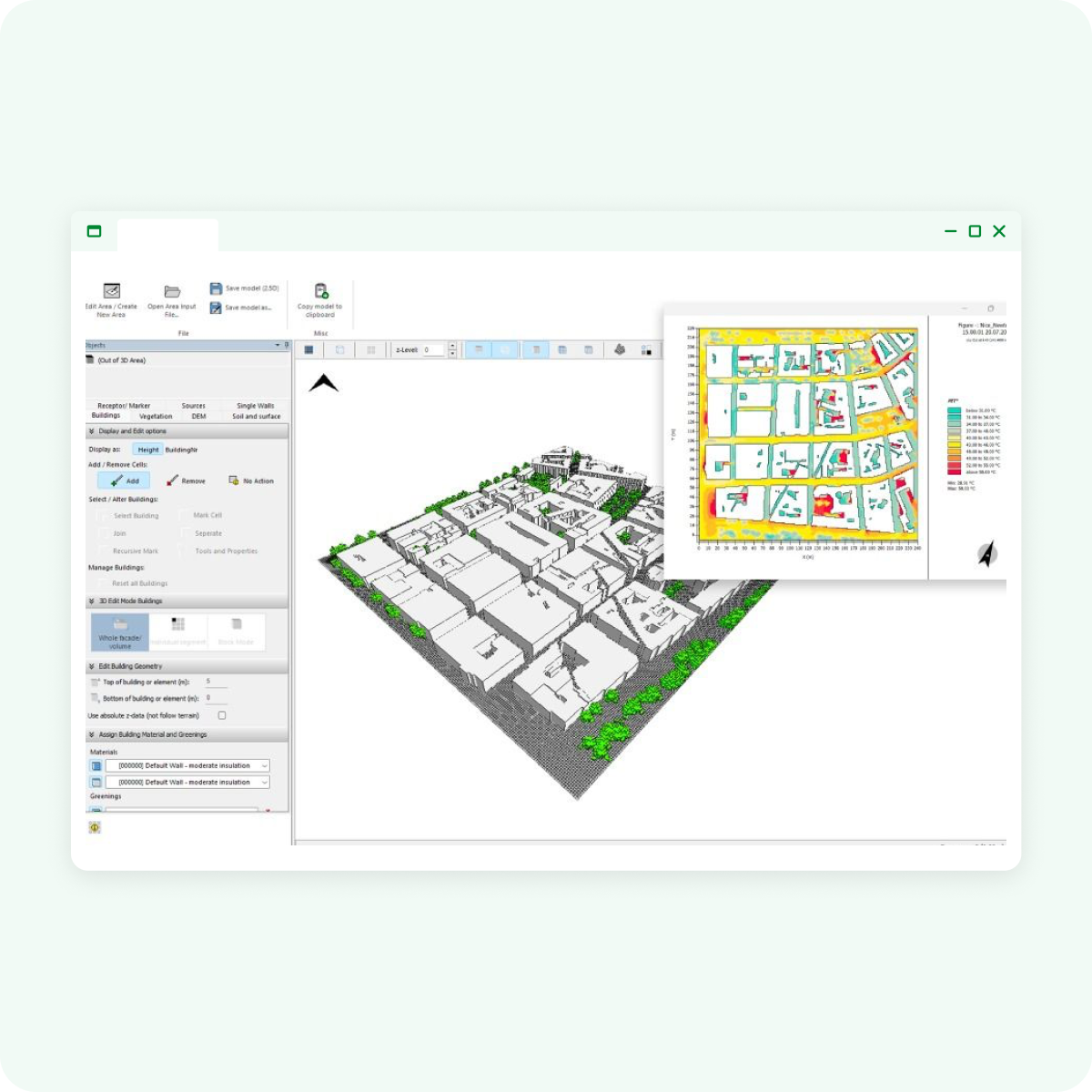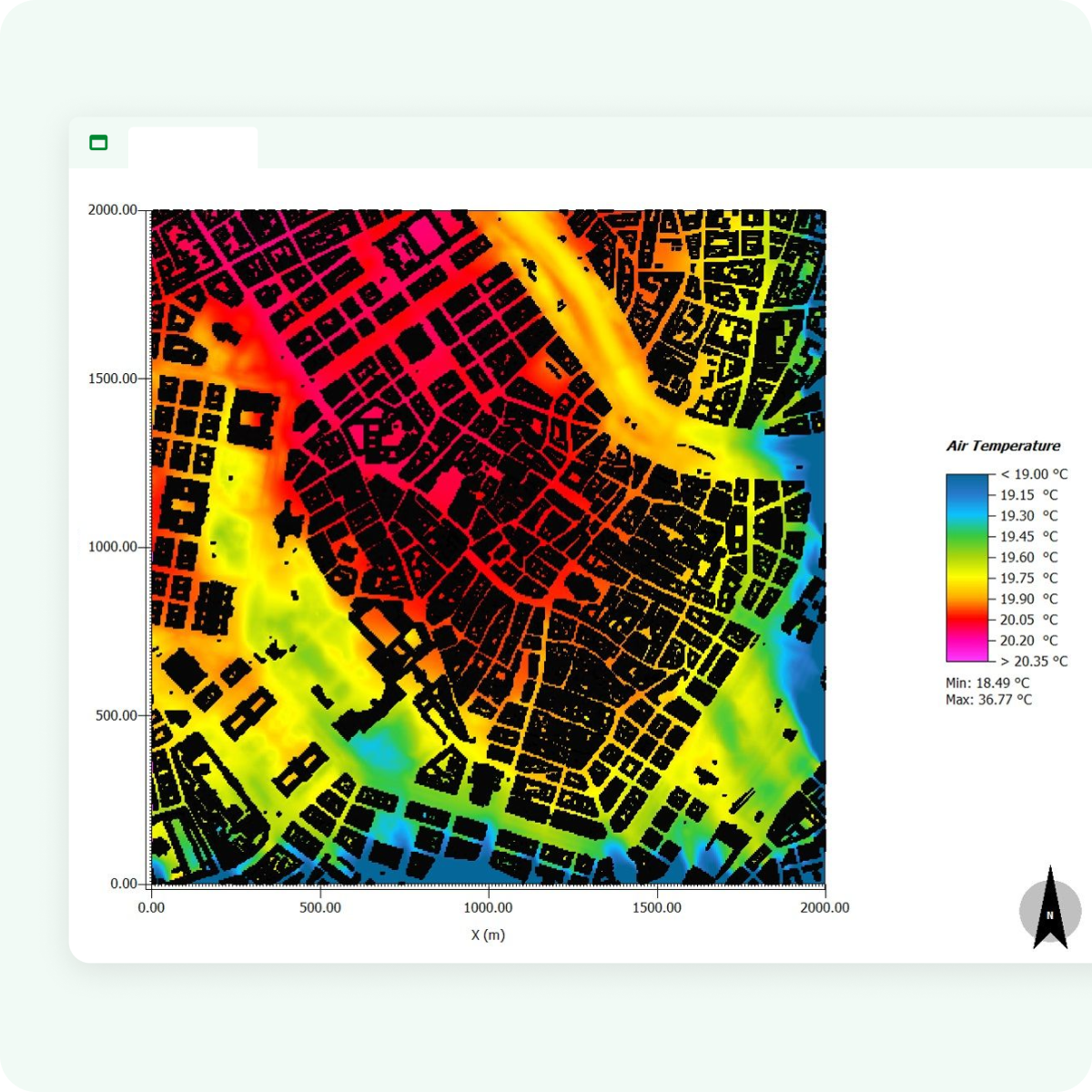ENVI-met
Reduce heat stress & improve liveability
ENVI-met from One Click LCA equips architects, urban planners, and developers with advanced microclimate simulation software to design urban environments that stay liveable under extreme heat.

Trusted by professionals — based on science
Capabilities
Design resiliency with integrated microclimate simulation
Solar analysis
Simulate short- and long-wave radiation, including shading and reflections, to design spaces that mitigate heat stress.
Wind flow modeling
Use high-resolution 3D simulations to understand wind patterns around buildings and through vegetation.
Building physics
Assess surface temperatures of roofs and facades to ensure energy efficiency and thermal comfort in your designs.
Green & blue technologies
Incorporate green roofs, facades, and water bodies to lower urban temperatures and enhance sustainability.
Outdoor thermal comfort
Calculate thermal comfort indices and simulate dynamic thermal comfort for for pedestrians in changing microclimatic conditions.
Vegetation analysis
Simulate plant physiology and water stress to optimize the use of greenery for heat reduction and environmental benefits.
Benefits
Protect human health & reduce urban heat
World's most advanced microclimate simulation software to:
- Improve design with real-time data on wind, heat, and air quality.
- Boost property value by optimizing outdoor spaces for livability.
- Strengthen proposals with data-backed, nature-based solutions.
- Differentiate your services by offering microclimate simulation.
- Maximize ROI with designs that cut energy use and increase value.

Case studies
One Click LCA acquires ENVI-met
The strategic acquisition combines One Click LCA's comprehensive environmental impact assessments with ENVI-met's advanced urban climate modeling.
FAQ
What is ENVI-met?
ENVI-met is a three-dimensional microclimate simulation software that enables the creation of sustainable living conditions in a constantly changing environment. ENVI-met’s interactive applications can scientifically analyze the effects of different design scenarios developed by architects or urban planners.
The calculation modules of ENVI-met cover a wide range of scientific disciplines – from fluid dynamics and thermodynamics to plant physiology and soil science.
The guiding principle of ENVI-met is to integrate all these different approaches into a single model, so that all elements can interact and reproduce the observed synergies.
What makes ENVI-met unique?
ENVI-met provides a highly detailed simulation of urban microclimates by modelling complex interactions between different environmental elements such as vegetation, water, building materials and airflow.
Its uniqueness lies in the way it can assess how different design scenarios affect heat stress and overall thermal comfort, going beyond simple heat measurements. The software provides detailed insights into wind speeds, pollution distribution and the physical and biological effects of urban design, such as how heat stress affects people as they move around the city.
It also models the interactions between these factors at the microscale, providing data on everything from energy storage in surfaces to the survivability of vegetation. These capabilities give actionable insights into how to design more resilient, sustainable cities that meet the needs of both the environment and its inhabitants.
Can ENVI-met simulate an entire city or regional-scale area?
ENVI-met can simulate environments of various scales — from single building blocks to entire urban areas. For larger models, a more powerful computer and increased memory are required to handle the complexity.
Although ENVI-met is designed for high-resolution simulations, the core physical principles of the model allow it to be applied to larger areas with broader grid resolutions. This makes ENVI-met suitable for some intermediate-scale or regional-scale applications, as long as the area’s characteristics can be accurately represented within the digital framework of the software. However, it does not offer mixed land use options like certain other regional-scale models. See all case studies here.
What data does ENVI-met require?
ENVI-met needs model data and weather data for its simulations. Model data can come from your designs (via QGIS, SketchUp, or Grasshopper plugins) or open data like OpenStreetMap.
For weather data, ENVI-met accepts formats such as CSV files from weather stations, EPW files, or user-created meteorological scenarios. The software uses this data to simulate interactions between built environments and microclimatic factors like temperature, humidity, and wind.
How can you integrate ENVI-met into an existing workflow?
ENVI-met offers plugins for QGIS, SketchUp, and Grasshopper, making it easy to integrate into your current workflow.
What scales and resolutions can ENVI-met model?
ENVI-met simulates microclimate conditions, typically focusing on specific scenarios such as hot summer days in urban neighborhoods. It models these conditions on a small scale, with horizontal resolutions ranging from 1 to 10 meters and simulation periods usually lasting 1 to 5 days.
The size of the simulated area — known as the model domain — generally ranges between 50×50 and 500×500 grid cells horizontally, and 20-50 grid cells vertically. A common use case for ENVI-met would be comparing two scenarios, such as a baseline and a greened design, over a 48-hour period. For instance, a typical model might have a resolution of 3 meters and cover a 750×750 meter area, with a grid structure of 250x250x30 cells (X, Y, Z).
What licenses does ENVI-met offer?
What is the connection between ENVI-met and One Click LCA?

Start building more livable urban spaces today
Advance better urban living with the world's leading microclimate simulation software.